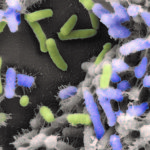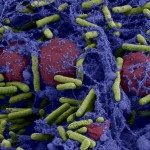Lien vers Pubmed [PMID] – 18826300
J Proteome Res. 2008 Nov;7(11):4659-69
To investigate the role of rpoS in gene expression of Escherichia coli cells grown as biofilms, we compared the proteomes of a rpoS mutant and the wild-type strain. Experiments were performed on planktonic cells (in exponential or stationary growth phase) and biofilms developed on glass wool. Spot-by-spot comparison of gels obtained from biofilm and planktonic wild-type organisms showed that the intensity of between 22 and 30% of detected spots was affected by the growth mode, depending of the control used. Principal component analysis, used to interpret the variations in protein spot densities, discriminated exponential-phase cells (wild-type and mutant) from the other incubation conditions and secondarily 72-old cultures. The statistical analysis demonstrated that the rpoS mutation did not significantly modify the proteome of exponential-growth phase cells, the differences involving only 3% of the proteome. However, increasing the incubation time from 8 to 72 h noticeably increased the number of changed proteins. A cluster analysis showed that RpoS plays a role in the special nature of the gene expression of biofilm cells but lower than in stationary-phase bacteria. We identified 35 rpoS-regulated proteins that were already or not described as controlled by this sigma factor. For some of them, the mode of regulation by RpoS was obviously dependent on the culture condition (planktonic vs biofilm).



